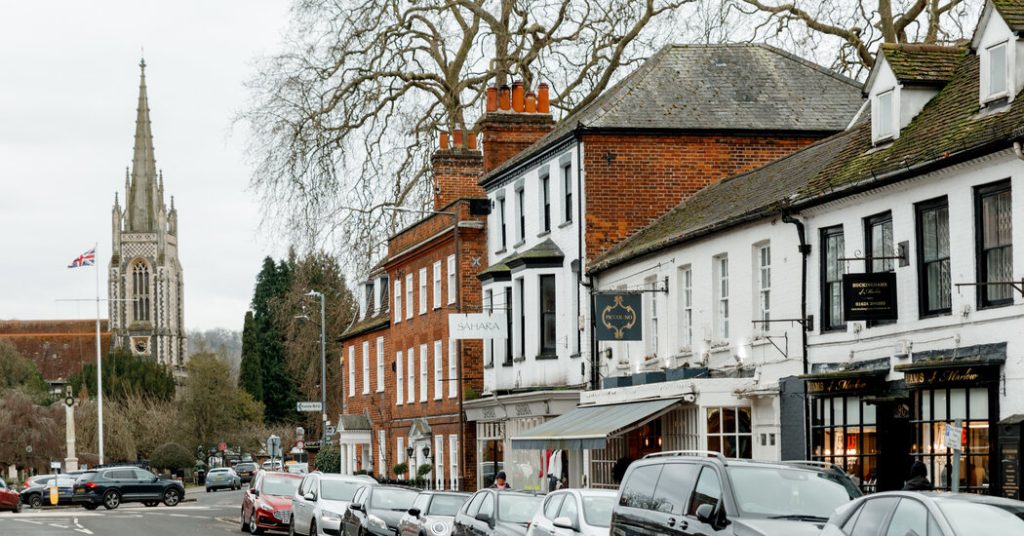Andrew Rackstraw has lived in Marlow, a small, wealthy town on the River Thames about 30 miles west of London, for nearly three decades. Its main streets are dotted with luxury boutiques, high-end cafes and stores like Saddle Safari, Mr. Rackstraw’s bike shop.
With a population of about 14,000, Marlow also has a plush cinema and a rowing club that dates to the 19th century. Around the corner from Mr. Rackstraw’s shop is a Michelin-starred restaurant. Farther down the road is Britain’s only two-Michelin-starred pub.
It is the picture of an idyllic English town.
But there is a threat, as locals see it, to Marlow’s quiet charm: a proposal to build a 750-million-pound ($950 million) film and TV studio complex. Plans include 18 soundstages, workshop space, offices and outdoor filming lots across 90 acres between Marlow and the smaller village of Little Marlow.
For more than three years, many Marlow residents have opposed the project, dubious of the developers’ promises that it will bring thousands of jobs, including creative roles, and more business for the town’s economy. “It will have the biggest impact to Marlow that we’ve ever seen because of the scale of it,” Mr. Rackstraw said on a recent morning inside his store.
In the past few months, the battle over this studio has taken on national significance as a marker of how far the British government will go to use development as a means to revive the nation’s stagnant economy. But the proposed film studio is not crucial infrastructure or needed housing, unlike much of the other development the government has vowed to speed up.
Marlow is “already choked with traffic,” Mr. Rackstraw said. The studio would bring thousands more cars, he added, and the town would “lose the very element that draws people to Marlow — the fact that it isn’t spoiled like so many other towns.”
Opponents seemed to be victorious last May when the local council rejected the planning application. But just a few months later, a new government, led by the Labour Party, breathed new life into the studio plans.
Britain’s creative industries, including film and TV production, have been designated a central part of the government’s economic growth agenda. These industries have long been a major cultural and economic force for the country, stretching back to the early 1900s. Alfred Hitchcock helped shaped the thriller genre in the 1930s in Britain. But the country also became a top destination for international productions, particularly since the 1970s when “Star Wars” filmed just outside London. More recently, blockbusters like “Wicked” and “Barbie” were filmed here. It’s the largest production hub for Netflix outside North America.
The Labour government has said economic growth is its No. 1 mission, but since the party came to power last summer, growth has been mostly elusive. Hampered by strained public finances, the government is depending on changes to the nation’s planning system as a crucial lever in generating growth. Ministers have proclaimed that they will “back the builders, not the blockers” to revitalize Britain’s economy.
The developers behind the project, led by Robert Laycock, the chief executive of the would-be Marlow Film Studios, appealed the council’s decision in September. A month later, Angela Rayner, the deputy prime minister and secretary of state for housing, communities and local government, stepped in and said she would decide whether to grant approval, a relatively rare intervention.
“There’s a growing consensus across the U.K. that the planning system is too restrictive and that this is causing problems,” said Anthony Breach, a researcher for Centre for Cities. “It’s too difficult to build, it’s too uncertain, it’s too judicial.”
But the Labour Party has started to loosen the rules, and there has been a “change in mood music,” he added.
Last month, the government said it supported adding a third runway to Heathrow Airport, potentially drawing an end to a two-decade debate on the subject. Ministers have also made it easier to build more houses around commuter rail stations and to speed up decisions on big infrastructure projects such as nuclear plants and wind farms. “The answer can’t always be no,” Rachel Reeves, the chancellor of the Exchequer, said recently.
The future of the Marlow film studio is in limbo. A planning inspector overseeing a five-week public inquiry, which ends Monday, will make a recommendation to Ms. Rayner. Another studio project, just seven miles from Marlow, is also hoping for Ms. Rayner’s approval to overturn a rejected application.
Mr. Laycock chose the land he wanted to build on about a decade ago. “It’s really tough to do anything in this country,” he said. But he said he was enthusiastic about the government’s changes to “get us out of this rut” of not wanting to do ambitious projects.
Most of the development would be on fields of thistles near several lakes where red kites fly overhead. But the complex would also nearly envelop a small area of housing, which includes more than 50 mobile homes where many retirees live and an early-18th-century house converted into apartments.
Thorsten Polleit, an economist who lives in one of the converted apartments, testified in the inquiry that residents would be “totally surrounded, literally incarcerated” by the development.
Among the reasons the Marlow studio has been contested is that it is proposed on a so-called green belt, which is land protected from development to stop urban sprawl. Green belt makes up 13 percent of England’s land.
The government is planning to reclassify some of the poor-quality parts of the green belt as “gray belt” and thus open it up to development, a change that has been mostly welcomed because it could accommodate more housing where people most want to live and work.
The plans for the Marlow studio also come after a boom in studio building in Britain. In the past five years, studio space has doubled to about six million square feet as developers and local authorities have capitalized on interest from American streaming giants including Netflix, Disney+ and Amazon Prime and British government support for the sector.
But the production industry was hurt by the Hollywood strikes in 2023, because most of the spending comes from the United States. And the big streamers have also spent less on content in recent years. Last year, the industry started to recover, with £5.6 billion spent in Britain on film and high-end TV production, 86 percent of which came from abroad. That was 31 percent more than in 2023, but did not return to the highs of 2021 and 2022.
“2024 was a transition year from the worst parts of the strikes,” said Adrian Wootton, the chief executive of the British Film Commission. He’s feeling “cautiously optimistic” about this year as filming picks up again, including for “Star Wars” TV shows and Season 4 of “Bridgerton,” and the benefits of enhanced tax relief measures introduced last year.
The commission has supported the expansion of studio space, including projects still in development such as the one in Marlow, but is not “banging the drum saying we need even more than that,” Mr. Wootton said.
Despite the hurdles, Mr. Laycock, the Marlow Film Studios chief executive, is committed to having the studio near Marlow. It’s the “right and only” location, he said, in part, because it is less than 10 miles away from Pinewood Studios, where many of the James Bond movies were filmed. Mr. Laycock is a great-nephew of Ian Fleming, the author of the Bond books, a connection he emphasizes amid accusations that he and his team do not have enough experience in the film industry.
“Nobody is denying that the planning system needs reform,” said Anna Crabtree, a parish councilor for Little Marlow, the village bordering the studio. But, she argues, one of the problems is that the system is biased toward people with money who can push forward “unrealistic proposals that local people know are not going to work.”
The battle has been “a huge drain on the local community,” she said. “It’s really stressful for local people.”






